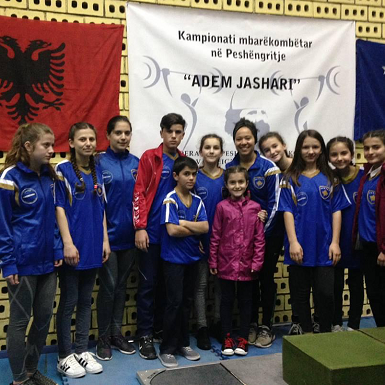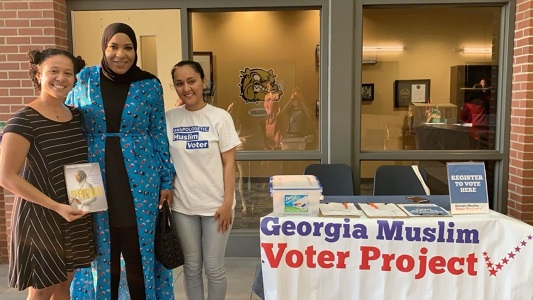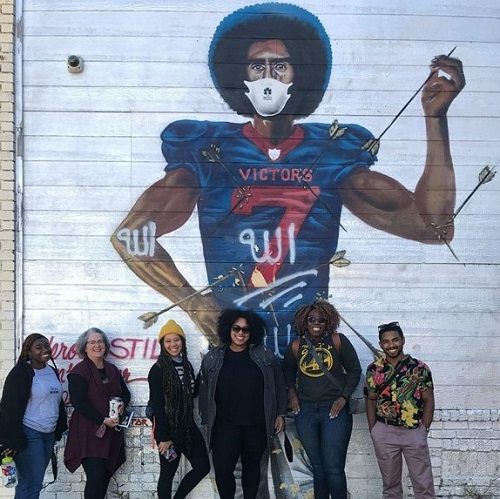Alumni Spotlight: Bella Cockerell (MDP '21)
 Q: First, describe your experience with the Peace Corps in Kosovo. What did that work mean for you, and why did you decide your next step was to earn your MDP?
Q: First, describe your experience with the Peace Corps in Kosovo. What did that work mean for you, and why did you decide your next step was to earn your MDP?
My time in the Peace Corps was a transformational experience. I realized that I love to create lasting, meaningful relationships with people. When I returned to the US, I decided I wanted to focus on nonprofit management and community engagement, but I soon realized that I lacked formal training. I needed to get a master’s degree and MDP had exactly what I was looking for.
Q: What were you involved with, on campus and off, while at Emory MDP?
In my first year I got very involved wit the 2020 elections. For example, I supported voter registration efforts with the Georgia Muslim Voter Project, interned with the Democracy Program at The Carter Center, and carried out qualitative research for Black Girls Vote. I worked at the polls, observed the recount for The Carter Center, and canvassed for voter registration and the census. I spent the summer of 2020 mapping leadership development programs in Atlanta for the Partnership for Southern Equity (PSE) to help identify gaps and needs for community capacity building.
My second year I ran and was elected as the Co-Vice President of Diversity, Equity, and Inclusion (DEI) for the Graduate Student Government Association. In that role, I worked on several initiatives, including a student-led diversity audit, and an Emory-wide DEI Strategic Planning process. As a graduate assistant for the Rule of Law program at The Carter Center, I helped launch a global campaign called “Inform Women, Transform Lives,” which partnered with 13 global cities (including Atlanta) to raise awareness about the transformative impact that access to information can have for women and the wider community.
Q: What aspects of the MDP curriculum did you focus on? How did that prepare you for your current work?
 While in MDP, in addition to the regular curriculum, I developed concentrations in Gender Justice and in Law and Development. I’ve always been interested in gender-related programming: for example, while in the Peace Corps I started women-led English classes as well as an Olympic Weightlifting girls club. I feel that these two concentrations have prepared me for my current work with the PSE, especially in learning to ask better questions around access (to information, resources, justice, etc.) and how it is equitably distributed.
While in MDP, in addition to the regular curriculum, I developed concentrations in Gender Justice and in Law and Development. I’ve always been interested in gender-related programming: for example, while in the Peace Corps I started women-led English classes as well as an Olympic Weightlifting girls club. I feel that these two concentrations have prepared me for my current work with the PSE, especially in learning to ask better questions around access (to information, resources, justice, etc.) and how it is equitably distributed.
Q: Talk a bit about the experience of starting an internship at the Partnership for Southern Equity and then soon after getting a job working with their Just Growth initiatives.
I was devastated when COVID disrupted my plans to do a practicum abroad in 2020, since I had planned to work internationally after graduating. When Dr. Roncoli connected me with PSE, I was excited because I had never worked in an organization that focused so directly on racial equity. It happened to coincide with the aftermath of George Floyd’s murder, which spawned a lot of important and challenging conversations around racial justice in and around Atlanta. I decided that I wanted to work in the diversity, equity, and inclusion field. As graduation approached, I noticed the job posting at PSE, applied, and was offered the position. It felt so great to return to a team I was familiar with. PSE feels like a family of advocates all reaching for the same thing.

I am typically out in different communities doing the thing I love most: interacting with people and groups and linking people to the resources they need to be effective change-makers.
I'm currently leading a project called the “Metro Atlanta Racial Equity Atlas” (MAREA), which builds on PSE’s 2014 “Metro Atlanta Equity Atlas”. MAREA is meant to serve as a living platform, providing residents and other decision-makers with access to equity data, from the macro to the micro scale, to inform decisions about public and private infrastructure investments, developments, and policies. Now I am planning community engagement events, where we will listen to community members and learn about how to make the tool more user-friendly and accessible.
 My team is also working on a project called “Development Watch Academy,” a pilot project created to educate residents on the history of commercial development in Atlanta, the politics behind it, and how to effectively intervene in that process.
My team is also working on a project called “Development Watch Academy,” a pilot project created to educate residents on the history of commercial development in Atlanta, the politics behind it, and how to effectively intervene in that process.
Q: PSE has been gaining a lot of prominence lately. Can you talk a bit about what’s behind that, and about what’s ahead for the Partnership?
PSE is growing immensely in terms of people and partnerships as well as funding. We recently received a $6 million grant from the Bezos Earth Fund to expand the work of the Justice40 Accelerator. This is a nationwide effort designed to help community-led environmental justice projects compete for federal funding flowing from the Biden-Harris administration’s Justice40 Initiative. This policy mandates that at least 40% of the benefits from federal investments in climate and clean energy solutions be directed to communities of color and low-income groups who have borne the worst impact of climate change and dirty energy.
When I was looking for a job in the DEI space, I wanted to make sure that it was not going to be in an organization where DEI is simply a performative engagement, all talk but no action. As a woman of color, I wanted to be in a space that didn't feel fake or forced, where I could feel like I could talk openly about issues. The future's so bright for PSE, and I feel lucky to be with them at such a pivotal moment in their history. Nathaniel Smith, CEO of PSE, has an amazing vision and is an inspirational leader and thought partner. I look forward to bringing about and furthering his vision with the same energy, enthusiasm, and passion that my colleagues bring.